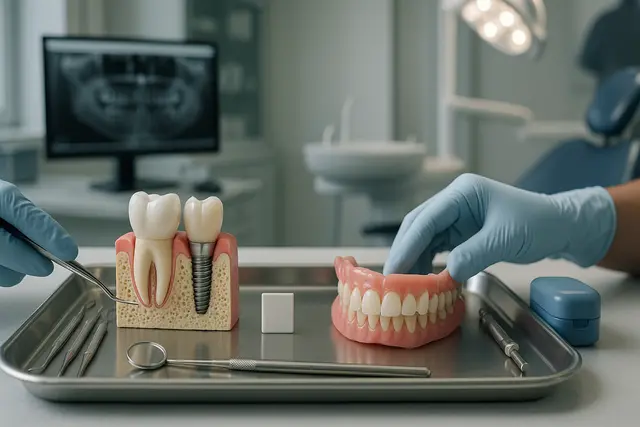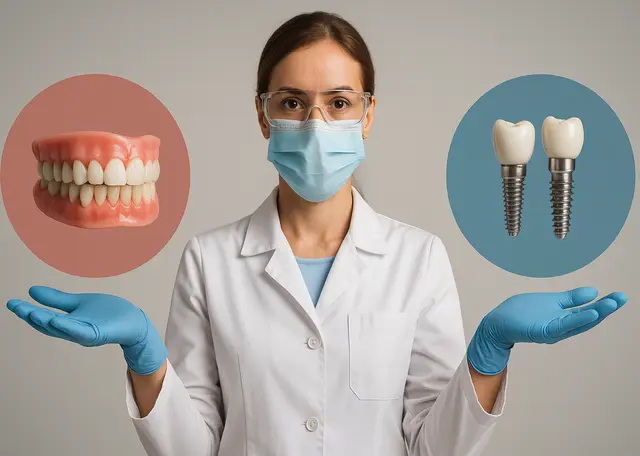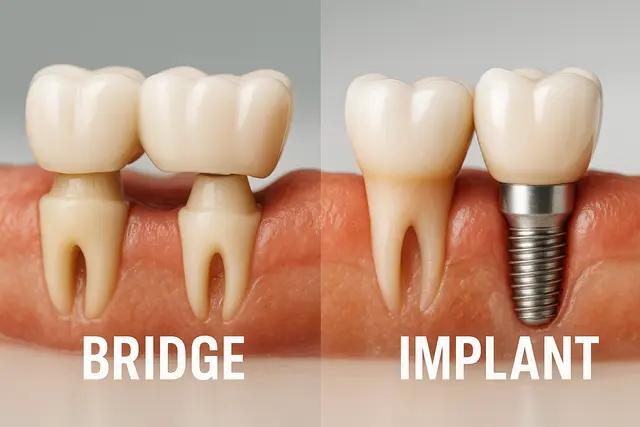Prosthodontics
7 min read
Oct 17, 2025
Implant vs. Dentures Pros and Cons: A Deep Dive into Modern Solutions
Missing teeth can impact more than just your smile, they can affect how you eat, speak, and feel about yourself. Fortunately, modern dentistry offers two leading solutions to bring back both function and confidence: dentures and dental implants. Understanding the pros and cons of each can help you make the choice that fits your needs, lifestyle, and budget.

If you’ve ever smiled in the mirror and found a gap where a tooth should be, you’re not alone. Missing teeth can throw off your bite, affect how you speak, make chewing tough, and, let’s be honest, take a toll on your confidence. Thankfully, modern dentistry has two leading tooth replacement options: the denture and the dental implant.
But here’s the million-dollar question: which one’s right for you?
We’ll break down the real-world pros and cons, not the textbook ones, of dentures and dental implants. Whether you’re considering dentures for the first time or wondering if it's time to upgrade to implants, this guide gives you what you need, clear, no-fluff advice with a touch of wit and warmth.
Denture Solutions That Fit Real Life
Let’s start with the classic. A denture is a removable prosthesis that replaces missing teeth. These aren’t your grandma’s clunky chompers anymore (although hers probably got the job done too). Modern dentures are made to look like natural teeth and can be pretty darn convincing when done right.
There are different types of dentures available, from complete dentures (when you’ve lost all your teeth) to a partial denture (which fills in just a few gaps). Dentures are removable and often seen as an affordable option when compared to implants.
But here’s the thing, dentures don’t offer the same level of comfort or functionality as something anchored into the jawbone. They can shift around, especially when you’re eating or talking. That might lead to some awkward social moments... or just a lot of denture adhesive.
Dental Implant Advancements You’ll Actually Feel
Now, let’s talk tech. A dental implant is a titanium post that gets placed directly into your jawbone. It acts like the root of a natural tooth and is topped off with a crown that looks just like the real deal.
Dental implants are designed to last for decades (yep, dental implants can last a lifetime if you treat them right). They’re stable, strong, and feel like natural teeth. No slipping, no clicking, no worrying about your teeth flying out during dinner.
But implants require a certain amount of jawbone to work with. If your jawbone has shrunk due to gum disease or years without tooth replacement, you might need a bone graft first. Implants also come with a higher upfront cost, and the implant procedure isn’t exactly a one-and-done deal, it’s a process that takes several months from start to finish.
Still, many patients feel the tradeoff is worth it for a permanent solution that doesn’t require glue, soaking, or removing at bedtime.
Pros and Cons You Actually Care About
Let’s cut to the chase. What are the real pros and cons of dentures and implants?
Dentures:
Dentures are more affordable up front
No surgery required
Can replace many teeth at once
Dentures need replacing every 5–10 years
Dentures tend to shift over time
Dentures do not require healthy jawbone
You have to clean dentures daily
Dentures may affect taste and speech
Dental Implants:
Look and feel like natural teeth
Dental implants provide stability and bone support
Implants can last a lifetime
Require healthy jawbone (or grafting)
Implants are more expensive initially
The dental implant process takes time and multiple visits
Dental implant surgery may require sedation
Implants require good oral hygiene and healing
The pros and cons of dental choices like these really come down to lifestyle, budget, and how important permanence and comfort are to you.
Pros and Cons of Dentures That Might Surprise You
Let’s zoom in on dentures a little. While conventional dentures have been around for centuries, they’ve come a long way. Still, the pros and cons of dentures include tradeoffs that not everyone expects.
Dentures offer a non-invasive fix for missing teeth. That’s huge if you have health issues that make surgery risky. Plus, dentures replace your smile quickly, no need to wait months like with implants.
But there’s a flip side. Removable dentures need special care. You’ve got to clean dentures daily and take them out at night to let your gums rest. Even high-end dentures may cause sore spots or affect your bite.
And although dentures are made to look like natural teeth, they don’t prevent jawbone loss over time. When the jawbone isn't stimulated by chewing through tooth roots or implants, it gradually shrinks. That leads to a sunken facial look, a.k.a. "denture face."
Dentures and Implants: A Hybrid Worth Noting
Here’s a fun twist: you don’t have to pick just one. Implant-supported dentures are like the best of both worlds. Think of them as dentures that snap onto implants placed in your jawbone. They’re more stable than traditional removable dentures but less costly than a full set of implants.
Patients who wear dentures often say this combo changes their life. No more slipping, better chewing, and your jawbone gets the stimulation it needs to stay strong. It’s also a great tooth replacement option if you’ve lost all your teeth but still want to avoid full-mouth implant surgery.
Tooth Replacement Choices Can Shape Your Health
Tooth loss doesn’t just change your smile, it changes how your entire mouth functions. When you replace missing teeth with implants, the pressure from chewing keeps your jawbone healthy. Without that, your body assumes the bone’s not needed anymore and starts to break it down. Not great.
With traditional dentures, that stimulation doesn’t happen. Over time, that can lead to changes in your bite, gum irritation, and changes in how your dentures fit. That’s why tooth replacement with implants is often considered the gold standard, especially for long-term health.
Get Dental Implants When You Want Stability and Strength
So when should you get dental implants? Here’s the general rule: if your jawbone is healthy, your gums are in good shape, and you’re willing to commit to the dental implant treatment process, go for it.
The dental implant procedure usually takes a few visits over several months. First, there’s a consultation and 3D imaging. Then, the implant is surgically placed into your jawbone. After healing, a crown or bridge is attached.
It’s a long game, but implants provide unbeatable strength and look just like natural teeth. And here’s a kicker, dental implants have a high success rate, especially when done by an experienced dental professional.
Dentures vs Implants: Which Feels Right for You
Choosing between implants and dentures isn’t just a clinical decision, it’s personal. Some people prefer dentures because they’re faster and less invasive. Others lean toward implants for that natural, worry-free feeling.
When you compare dentures vs implants, it helps to think long-term. Dentures are more affordable upfront, sure. But the cost of dentures over time, especially with replacements and adhesives, adds up. Implants are more expensive at first, but they last longer and require fewer adjustments.
Also, implants feel like your own teeth. You eat, brush, and live with them just like you would with natural teeth. That comfort and freedom? Priceless to a lot of patients.
Cons of Dental Implants You Need to Know
As much as we love implants, they’re not perfect for everyone. Here are a few cons of dental implants to consider:
Implants require surgery, which comes with healing time and possible complications
Implants may not work for patients with uncontrolled gum disease or weak jawbones
The cost of dental implants can be a barrier, especially without dental insurance options
Implants require a commitment to excellent dental care for long-term success
So yes, they’re amazing, but not a magic bullet. A likely candidate for the dental implant is someone with good oral health and the patience for a longer healing process.
Pros and Cons of Dental Options You’ll Actually Use
When weighing the pros and cons of dental solutions like dentures or implants, remember: it’s about what fits your life.
Traditional removable dentures work well for many. If you’re considering dentures, talk to your dental office about fit, materials, and care. If you choose dentures, keep up with regular cleanings, clean dentures daily, and replace them when needed.
If you’re leaning toward implants, the dental implant treatment takes more time, but the payoff is a strong, natural smile that doesn't quit.
Cost of Dentures Compared to Implants
The cost of dentures varies depending on the type, full dentures, partials, or implant dentures. Dentures are more affordable up front, making them accessible for a lot of patients. The downside? Dentures tend to need more frequent replacing and adjustments.
The cost of implants is higher at first. But implants are designed to last, and many patients find them more cost-effective in the long run. Implants can vary in cost depending on how many you need, whether bone grafting is required, and your specific dental needs.
Make sure to talk to your family dental practice about payment plans, dental insurance options, and what’s realistic for your budget.
What Is the Main Difference Between a Dental Implant and a Partial Denture?
A dental implant is a fixed, long-term solution where a titanium post is placed in your jawbone to support a crown that mimics a natural tooth. It helps preserve bone and doesn’t rely on neighboring teeth. A partial denture, on the other hand, is a removable appliance that fills gaps using artificial teeth attached to a gum-colored base. It clips onto your existing teeth and offers a quicker, more affordable option, but lacks the stability and bone-preserving benefits of implants.
When Is a Partial Denture a Better Option Than a Dental Implant?
A partial denture may be the better choice if you’re missing several teeth but still have healthy ones remaining. It's also ideal if you need a more affordable or non-surgical solution, or if you're not a candidate for implants due to bone loss or health concerns. While not as permanent, partials can be adjusted or remade over time and still restore your ability to chew and smile.
What Are the Pros and Cons of Choosing Dental Implants?
Dental implants are durable, natural-looking, and help prevent bone loss, making them an excellent long-term investment. They don't affect nearby teeth and function like real teeth. However, they do come with a higher upfront cost, require surgery, and involve a healing period before the final crown is placed. Not everyone may be a candidate, especially if there is insufficient bone or certain medical conditions.
How Do I Decide Between Dental Implants and Partials for Tooth Replacement?
The right choice depends on your dental health, budget, lifestyle, and long-term goals. Implants are best if you're looking for a fixed, natural-feeling solution and are in good health for surgery. Partials are more cost-effective and quicker to get, making them suitable for temporary or transitional use. A consultation with your dentist can help you assess which option meets your functional and aesthetic needs best.
Read Next
Related Posts

Prosthodontics
Full Mouth Implants vs. Dentures: Which Is Better for You?
When it comes to replacing missing teeth, the choice between full mouth dental implants and dentures can be overwhelming. Each option has its own set of benefits, limitations, and long-term considerations, making it essential to understand what works best for your needs, health, and lifestyle.
5 min read
Oct 17, 2025

Prosthodontics
Tooth-Supported Bridge vs. Implant Comparison: Benefits, Drawbacks, and Insights
Deciding between a dental bridge and a dental implant can feel overwhelming, especially when both options promise to restore your smile and improve oral function. Each solution comes with its own set of benefits, considerations, and ideal use cases, making it essential to understand how they compare before choosing what’s right for you.
6 min read
Oct 17, 2025

Prosthodontics
Dental Implants vs. False Teeth Comparison: A Side-by-Side Look at Options
Losing teeth can be a life-changing experience, affecting everything from your smile to how you eat and speak. Fortunately, modern dentistry offers reliable solutions to restore both function and confidence. This article explores the key differences between dental implants and false teeth, helping you understand which option might suit your needs best.
6 min read
Oct 16, 2025
Don’t have time to research every dentist around you?
See why 30k+ patients trusted us